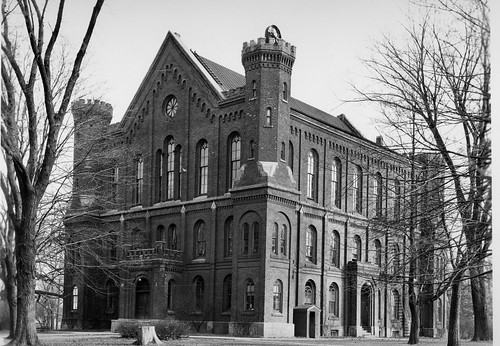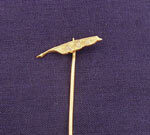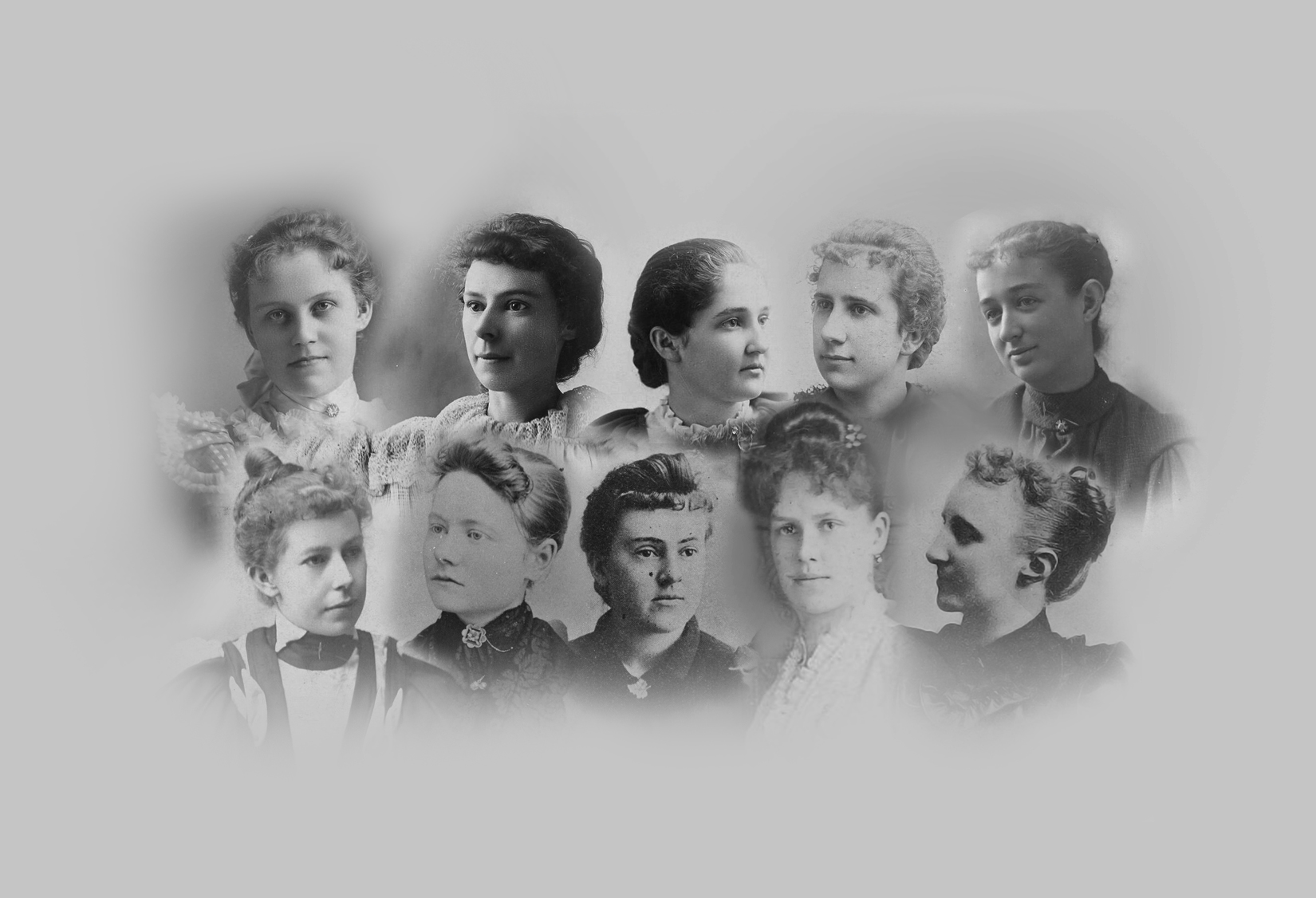
In the 1890s, Lombard College in Galesburg, Illinois, admitted women students, but provided little for them other than academic programming. Physical facilities for women were limited and only a few cultural and spiritual programs were offered for them. In 1873, a local sorority named I.C. Sorosis had become a chapter of Pi Beta Phi National Fraternity, becoming the only organized women’s group on campus. Chapters of Phi Delta Theta and Sigma Nu provided fraternal life for the men on campus. Social activities and a nucleus of friendship were available to their members.
Harriet Luella McCollum had attended Lombard Preparatory School for two years, and in 1893 was a student at the college. Along with Cora Bollinger, she wanted to form a local sorority to encourage personal friendships, promote friendlier contacts with the entire student body, and be of active service to the college. Harriet and Cora shared rooms, one of them a sitting room sparsely furnished with a few straight-backed chairs, two low rockers and a small table. Harriet and Cora met in these rooms behind drawn shades with Lucy Gilmer, Eliza Curtis, and Frances and Almira Cheney. Before long, Bertha Cook, Julia Maude Foster and Lewie Strong joined them and their secret planning became intense.
Alice Bartlett, the youngest at only 15, completed the circle of ten. Attempts by other groups to organize societies had failed, so secrecy was vital until the official announcement of their plans was to be made. Never more than two girls at a time would arrive at the rooms for a meeting, spacing their arrivals to avoid suspicion. When they saw each other on campus, they were very casual.
Lucy Gilmer and Lewie Strong lived in rooms at Mrs. Hadley’s Boarding Hall. Most of the other girls living there were Pi Phis, so Lucy and Lewie ignored each other for fear of giving away their plans. Years later, Lucy and Lewie talked about ducking below the windows of the trolley on their way to planning sessions so that no Pi Phis would see them.

Since the Pi Phis and Phi Delts had been closely aligned, the idea of another women’s group was enthusiastically welcomed by the Sigma Nus.
Several Sigma Nus assisted the fledgling group with organizational ideas. The Constitution and Bylaws were drafted and signed in Julia Maude Foster’s room because it was far from the campus and thought to be safe. A service had been written and a song, whistle, and yell composed. Inspired by the familiar quote, “The pen is mightier than the sword,” Lewie Strong had designed the badge, a Quill. The design was given to a local jeweler in anticipation that the Quills would be ready for the girls to wear when they made their first public appearance and announcement. In case the sorority chose to affiliate with Kappa Kappa Gamma when it “went national,” the colors chosen were double blue.
Cora and Lucy chose the pink rose as a complement to the white rose of Sigma Nu. A committee chaired by Cora Bollinger called upon Professor John C. Lee, acting president of Lombard College, to present their plans. They received not only approval but also assurances that the faculty would be pleased to have a second women’s fraternity on the campus. Richard Brown, a leader of independent students, was told of the plans and also lent encouragement to their cause.
Although their badges were not ready, they set the date of April 17 to make their new Fraternity public. A few minutes before chapel time, the Founders met in the room of the Zetecalian Literary Society to pin on knots of double blue ribbon and pink roses, which had been smuggled into the room.
With sparkling eyes, flushed cheeks, and proud postures, the ten young women entered the chapel after the faculty and students had been seated. They quietly sat near the back of the room. After a moment of startled silence, the Sigma Nus led congratulatory applause. After Chapel, the girls showed their spirit with the yell they had composed, with emphasis on the last two lines.

for their new Greek sisters to mark this special occasion, two of them outraced two Phi Delts to buy up the box seats for a performance of “Othello,” being presented at the Auditorium on April 25. The Alphas and the Sigs enjoyed the play immensely. The Quills were finally ready on April 26, and one of the Founders noted on the card to which these stickpin badges were attached, “too late for ‘Othello’.” Bertha Cook Evans recalled years later that the badges cost $1.25 each, dues were 25 cents a term, and each girl paid an equal share of expenses for parties. The parties were usually held at Alice Bartlett’s home because she was the only town girl in the group.
Bertha also told about a serenade at a Sigma Nu meeting, which was after 6 o’clock one evening. Young ladies were not permitted to be on campus at this hour. The next morning, telltale footprints made by the Alpha Xis in a patch of bare ground were noticed by a member looking out from the window of a classroom. A friendly Sig enlisted a kindly janitor to rake the ground before the footprints could be discovered by a faculty member. The Alpha Xis’ terrible crime remained a secret.
Edna Epperson realized that plans should be kept under cover if they were to be successful. She asked her father who among his group of attorney friends could be trusted to help. He referred her to J.J. Welsh, a Sigma Nu. Alice Bartlett was chosen to assist in the effort. During the fall, winter and spring of 1901-1902, the two young women visited Mr. Welsh about ten times to build the plans and write the preliminary constitution.
In February, Edna and Alice submitted their plans. Later, contacts began with the girls in the PEO chapter in Mount Pleasant, Iowa. They had indicated they were interested in becoming the second chapter in a new women’s Greek letter organization.

We, as Undergraduate Members of women’s fraternities, stand for good scholarship, for guarding of good health, for maintenance of fine standards, and for serving, to the best of our ability, our college community. Cooperation for furthering fraternity life, in harmony with its bets possibilities, is the ideal that shall guide our fraternity activities.
We, as Fraternity Women, stand for service through the development of character, inspired by the close contact and deep friendship of individual fraternity and Panhellenic life. The opportunity for wide and wise human service, through mutual respect and helpfulness, is the tenet by which we strive to live.
1. A woman who is or who has ever been an initiated member of an existing NPC fraternity shall not be eligible for membership in another NPC fraternity.
2. To be eligible to participate in Panhellenic recruitment and pledge an NPC fraternity, a woman shall:
A. Not be simultaneously enrolled in high school and attending college.
B. Be regularly matriculated according to the definition of matriculation established by that institution.
3. An undergraduate woman shall not be asked to pledge an NPC fraternity during any school recess except during a primary membership recruitment period and the ensuing continuous open bidding (COB) process when held immediately before an academic term.
4. Each College Panhellenic Council shall establish a Bid Day to conclude the primary membership recruitment period. A Bid Day is the scheduled time when invitations to membership are issued.
5. If through the primary membership recruitment process, a potential member receives a bid and declines it, then she is ineligible to be pledged to another NPC fraternity on the same campus until the beginning of the next year’s primary membership recruitment period.
6. At a later date but before the next primary membership recruitment period, if the potential member who declined her bid expresses interest in being pledged to the chapter with which she originally matched, she may do so only if the chapter extends another bid and has quota or total spaces to fill.
7. If a potential member does not receive a bid at the end of the primary membership recruitment period, she is eligible immediately to participate in COB.
8. If through the primary recruitment process a potential member accepts a bid and then has her pledge broken by an NPC fraternity or breaks her pledge, then she is ineligible to be pledged to another NPC fraternity on the same campus until the beginning of the next year’s primary membership recruitment period.
9. A COB acceptance is a binding agreement. If a potential member accepts a bid, signs a COB acceptance and then has her pledge broken by an NPC fraternity or breaks her pledge, then she is ineligible to be pledged to another NPC fraternity on that campus until the beginning of the next year’s primary membership recruitment period.
10. A woman who has accepted a bid either through primary or COB recruitment and who has had her pledge broken by an NPC fraternity or has broken her pledge, may be repledged by the same NPC fraternity chapter on the campus at any time before the beginning of the next year’s primary membership recruitment period, even if the chapter is over total.
11. When a woman who has been pledged but not yet initiated transfers to another campus, her pledge is broken, and she is eligible to pledge an NPC fraternity on that campus at the earliest opportunity.
12. Women who have been pledged but not yet initiated into a chapter whose charter has been rescinded or relinquished or of a colony that has been dissolved shall be eligible to pledge another NPC fraternity immediately following the official release by the NPC fraternity.

Since the beginning of our sorority existence, Alpha Xi Delta has fondly thought of Sigma Nu as our “brother” fraternity. Of course, it is an unofficial relationship, but Sigma Nu played a significant part in our founding and for that reason, you will always hold a special place in our hearts.
Nine years after the founding, the decision was made to extend our Sisterhood beyond Lombard and the large task of making Alpha Xi Delta into a national sorority began. Again, as in the beginning, counsel was taken with Sigma Nu in the person of J.J. Welsh, a Galesburg attorney, and alumnus of the Lombard chapter. His unlimited service and good advice aided us tremendously during that time. We also conferred many times with Charles W. Jones, Sigma Nu, during the writing of our National Constitution.
Still another Sigma Nu with an interest in Alpha Xi Delta was Albert H. Wilson, the “Brother Bert” of Sigma’s Hall of Honor. His association began in 1902 at Mt. Union College when the S.L.C. Society made out a petition for a charter to become Gamma Chapter of Alpha Xi Delta. He recalled being on Miss Emily Kay’s front porch, helping to write that petition. He wrote, “Long may the beautiful roses, pink and white, bring prosperity and kindly living into the ways of our fraternities.”
Even our first National Convention in 1903 was enlivened by our Sigma Nu friends. According to our magazine, then called The Alpha Xi Delta, by arrangement, our first convention was held at Lombard the same time as Sigma Nu’s Fifth Division convention, and it proved to be a pleasant idea. A joint reception was held in the Lombard gymnasium, with an orchestra providing music for dancing. Following the reception, cars were waiting to take the groups downtown to their respective banquets. The girls’ car ran off the track and forced all to join together in the boys’ car, enlivening the trip with “frat songs and yells.”
Naturally romance also brought Alpha Xi and Sigma Nu together. Alice Bartlett Bruner recalled that they were “very, very attentive . . . and one year every Alpha Xi had a Sigma Nu beau . . .” Of our ten Founders, only six ever married. Five married Sigma Nus. Julia Maude Foster once said, “Five of the ten married Sigma Nus. The other five of us failed.” The romantic ties between Alpha Xi Delta and Sigma Nu proved to be very special ones, but of course, our relationship went far beyond that.
The invaluable support and assistance Sigma Nu gave us during the struggle for recognition and a place in the fraternity world at Lombard are something we will never forget. And you will always remain a “brother” fraternity to us.